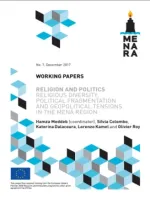Religion and Politics Religious Diversity, Political Fragmentation and Geopolitical Tensions in the MENA Region

MENARA Working papers, nº. 7
Motivated by the need to inform the enduring and unresolved debates about religion and politics in the Middle East and North Africa (MENA) region, this report focuses on the relation between social change and religious diversity and the challenges this poses for the state–religion relationship. It also draws attention to the pluralization of the religious sphere, the individualization of religion and the unlikely return of a state monopoly of Islam. In a context marked by growing instability (coups d’état, popular uprisings, conflicts, political uncertainty), this report examines the future of political Islam, a major ideological trend in the region. It aims to offer a detailed historical and sociological analysis of the different trajectories of moderate political Islam movements, the emerging processes of doctrinal transformation, electoral and governmental participation and the extent to which they have challenged both Islamist organizations (Muslim brotherhood-affiliated organizations, Salafi movements) and jihadi movements (ISIS, al Qaeda). Ultimately, the report analyses the relations between religion and politics within Shiism (one of the two major branches of Islam), within Christian communities and finally within the major non-Muslim majority society in the region, Israel. Strongly objecting to prevailing reductionist and essentialist misrepresentations of the region and their sweeping doom-mongering generalizations, the report sheds light on the distinct dynamics of local histories, inter-organizational competition, the arising ideological tensions and geopolitical rivalries.
Keywords: Religious diversity; Challenges; MENA Region; Conflicts; Geopolitical Tensions; Political Uncertainty